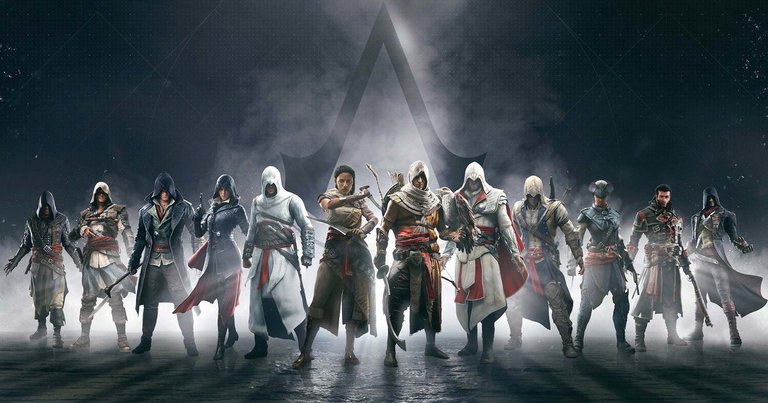
Assassin's Creed: Brotherhood review he made me want to actually go through with this...thing.Hello there! I am a big fan of Assassin's Creed (or was, I guess). Recently, my friend @cm0isa started delving into the series, sometimes streaming his gameplay through Discord and us talking about and around it. He is a goddamn bad influence and with his
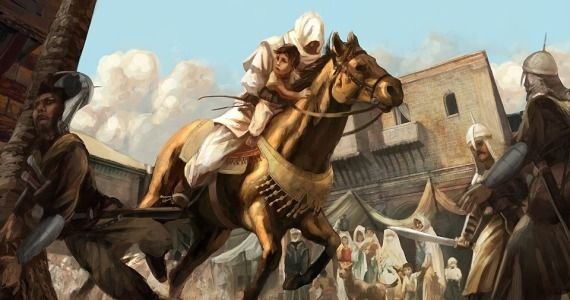 Image Source
Image Source
As most of you know, Assassin's Creed started as a Prince of Persia spin-off, called Prince of Persia: Assassins. This is important as it shows us that even early on, Patrice Desilets and his team within Ubisoft Montreal knew what game they wanted to make. They wanted a game with the cinematic flair of the Sands of Time trilogy of games, featuring one of the core tenets too: acrobatic traversal. The game evolved into its own standalone IP and the design of it was constructed on 3 very important pillars: combat, navigation and social stealth. None of the games fully realised any of the pillars to their full extent, each one lacking in one way or another, but compensating for it, at least in the beginning.
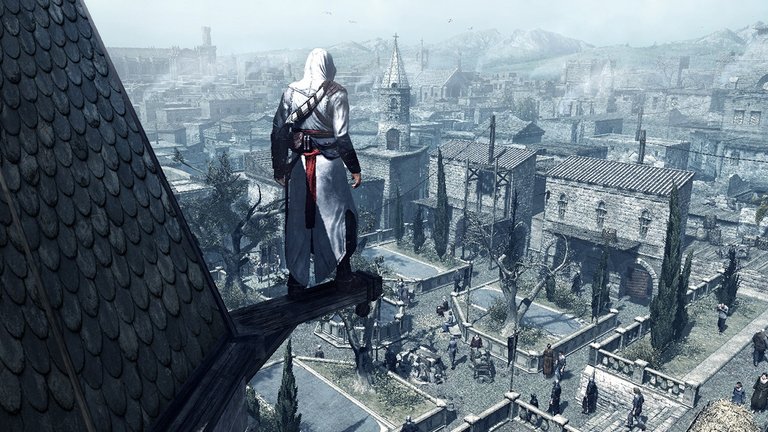 Image Source
Image Source
The first game was a tech demo for Ubisoft's shiny at the time Anvil Engine, featuring seamless mission starts, with no loading screens or breakage of the immersion through button prompts, the quest or cutscene just starting when you reached their general area. This, to this day, at least for me, still makes the game feel next gen, combined with the minimalist UI. In additon to that, the present day segments hated by most of the player base were actually the driving force, since they knew to cultivate a mystery and they also offered a change of pace from time to time, so you wouldn't have time to get bored in the memory segments, at least in theory. In practice, Assassin's Creed really lost its steam after the second visit to each city since you repeated the same few intel gathering activities, even though that is a pretty realistic representation of the way an actual assassin would operate.
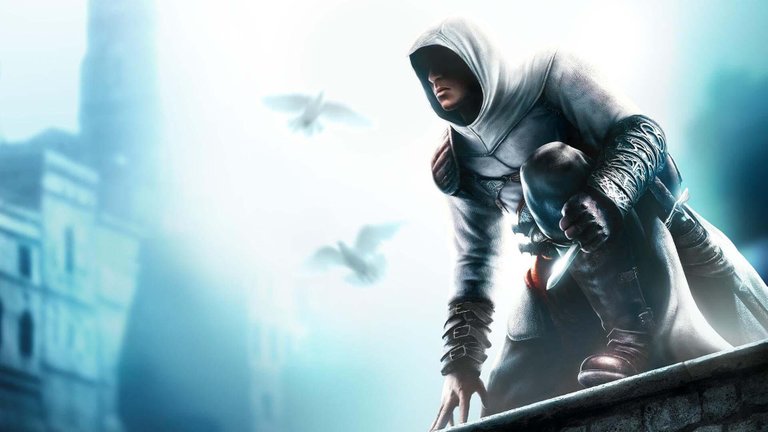 Image Source
Image Source
The first game did really well financially, so, of course, a sequel was greenlit, Assassin's Creed II. That has to wait though, because Altair would get a sequel of his own on the PSP, called Bloodlines. This game is a direct sequel to Altair's story, having this dude go to Cyprus to thwart some more Templar plans. The game was a great experience, featuring a more linear design, but improving on all aspects of gameplay in the main game, including mission design. On a handheld, introducing the ledge assassination which everyone got used to at this point, and an upgrade system based on currency you could find in the game. Sadly, there was no modern day for this installment, but it is a game miles better than it had any right to be and a genuinely essential piece of the early story of the series.
 Image Source
Image Source
Now, on to the big boy, Assassin's Creed II. This was my true gateway to the series, and what an entrance. The music, the charisma, the style, the mystery. Everything flowed so well to get me from 12 years ago hooked. I can still recite the title drop sequence word for word, even now. This game was a total overhaul of everything we saw in the prequel: social tealth was improved, now letting you blend with any crowd and even being able to create distractions with groups of courtesans, thieves and mercenaries. On top of that, the social stealth also got a subsystem with the addition of notorety, affecting the way guards acted in your presence, from treating you like just some guy to hunting you on sight. Add to that the modern day which was stil propelling you forward, reliving Ezio's memories so that Desmond may gain his skills. This game was so succesful, that it got 2 more sequels to complete Ezio's arc, from mourning and vengeful teenager to a retired old man settling down after fighting all his life. In addition to that, at this point the series was annualized, so Ubisoft Montreal had less than a year for both Brotherhood and Revelations, but you couldn't really seeit since game development was much simpler back then. They still found the time to create new things to freshen the experience, like a full-on unique multiplayer mode, the brotherhood system introduced in...well...Brotherhood and the bomb crafting in Revelations. These games even got a shotr movie as an epilogue, Assassin's Creed: Embers. a bittersweet ending to Ezio's story, dying in his home town of Florence, after passing the Assassin torch, and with his family, ending with a speech that brings tears to my eyes even today.
 Image Source
Image Source
Even though the game were still great in spite of Ubisoft, by Brotherhood most of the original team wasn't around anymore, and with them all the original plans for the series and how it should actually end went away too. Still, the series was tying itself to 2012, as was every piece of media featuring the end of the world before 2012. It was and still is charming, but playing the 10 years after the fact ruins a bit of the magic.
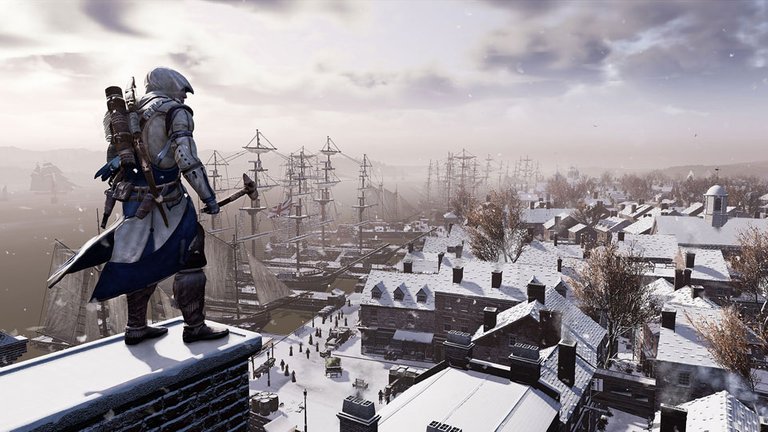 Image Source
Image Source
With that 21-12-2012 deadline for their story, in 2012 we received what everyone thought was supposed to be it. The grand finale. Assassin's Creed III was coming, with a shiny new engine, Anvil Next, shiny new gameplay and graphics and, after 3 years, a new protagonist: Connor Kenway. The game tried to explore the grey areas of the ideologies of the Templars and Assassins, pulling a bait and switch in the beginning and having you play as Haytham Kenway, Connor's dad, who is, indeed, a Templar. Gameplay-wise, stuff got simplified a bit, the movement now requiring less buttons and being more automated, but now permitting climbing trees. The combat got a full overhaul, not all enemies could be killed with counters and some could interrupt chains, adding a bit of depth to the combat. Even the stealth got new stuff, with bushes into which you could hide and also being able to take cover near building corners, while the social stealth got a few new blending opportunities, like talking to random people on the street. Sadly, the stealth also got worse, detection being very inconsistent, ometimes enemies being able to detect you instantly and other times being completely blind. Story-wise, the game was slower and more restrained than Ezio's games, trying to explore Connor's trauma and his character development over the course of the game, learning to open up to those who become his friends. Back in 2012, I and many others didn't really appreciate this game and what it was trying, expecting a huge finale for the series, but nowadays I can appreciate it a lot more.
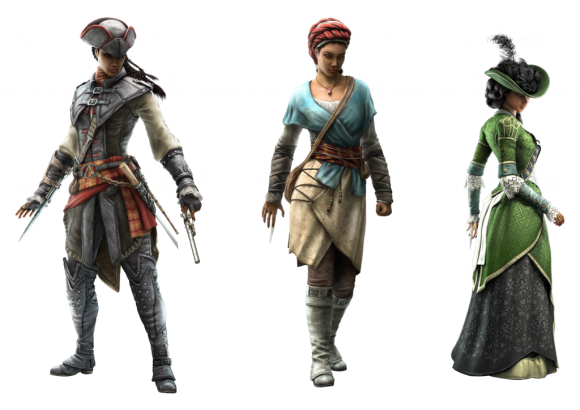 Image Source
Image Source
Paralelly with III, there was a Vita side game called Liberation. It was a mishmash of assets and mechanics from II and III, creating its own feel, but the story was ultimately bland and pointless in the grand scheme of things, the only additions being the persona system (having different outfits with different gameplay) which sadly never came back and the protagonist, Aveline de Grandpre who did a lot of heavy lifting to make the game at least bearable with her interesting character development and personal history through the story.
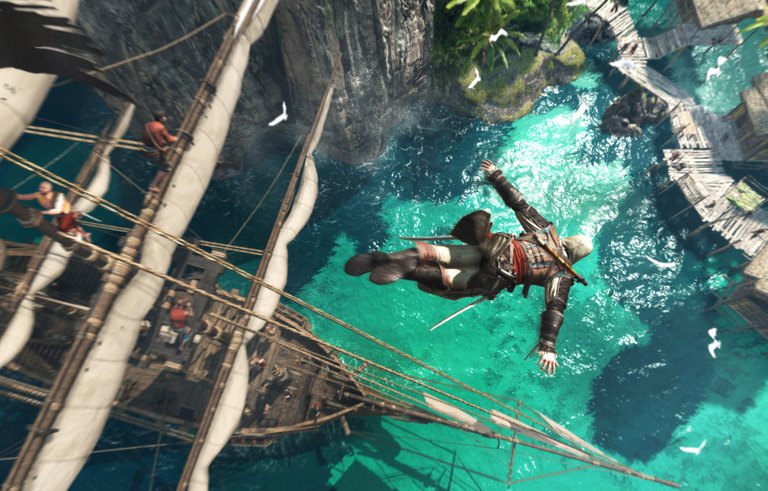 Image Source
Image Source
With the series theoretically ended by a huge spoiler I will not mention, relating to the present day, suddenly in 2013 we got trailers for Assassin's Creed IV: Black Flag, literally unearthing the fresh corpse of the series after its theoretical ending. At this point, it was still fresh enough so you couldn't really notice the decay, at least at first. The game follows the development of Edward Kenway, Connor's grandfather, evolving from a pirate to an Assassin, trying to explore both main ideologies of the series from the point of view of an outsider. While the game was still great and the story was still enjoyable, the concept went pretty stale, as there was nothing new really said about the Templars and the Assassins. This was also the last game with the multiplayer mode. The modern day should be mentioned as it started the trend we are facing now of being meandering and having no urgency or mystery and also going off the rails with the obsession for the First Civilisation.
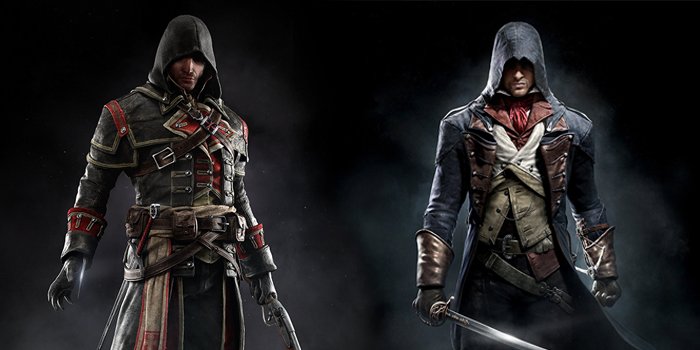 Image Source
Image Source
Now we reached a combo of main games, on the cusp of the end of the PlayStation 3 and Xbox 360 era. The old gen systems got Assassin's Creed Rogue, the story of Shay Patrick Cormack, an Assasin who took the side of the Templars after causing the earthquake which wiped Lisbon from the map in the 1700s at the orders of his master and being shot in the back once he tried to prevent this ever happening again. This game's ending directly links into the beginning of Assassin's Creed: Unity, a game which I can only characterise with 2 words: missed potential. It is at the same time the greatest and worst game in the series. When it works, the parkour is unmatched, offering you a lot of control, up and down being separate commands. The stealth profits from having hug crowds during the French Revolution and also new tools like actually having a crouch button and a full on cover system. The combat was revamped again, beign based around parrying attacks and breaking the enemy's guard. This all sounds great, until something breaks and everything is ruined. Sadly, the story doesn't do much after the stellar intro, meandering and going from target to target until the final act and the story picks up again. You play as Arno Victor Dorian, a charismatic trouble maker which initially feels like Ezio, but during the game turns into a dark image of him, succumbing to anger and vengeance. In the final act he is a broken man, only beign picked up by his love for the girl he grew up with, who is a Templar. The ending is a tragedy for Arno, and I won't spoil it, since it's one of the good 2 parts of the story. The game also got a DLC, Dead Kings which was given for free after the disastrous state the game was released in. This is where Unity shines. The disparaged Franciade is a grim but stunning place, with creatively designed quests and a genuinely good story, seeing Arno's redemption arc and him thwarting Napoleon's plans in the region. Sadly, they have given up on the modern day by this point, it being resumed to "this was pointless but good work". The corpse decays.
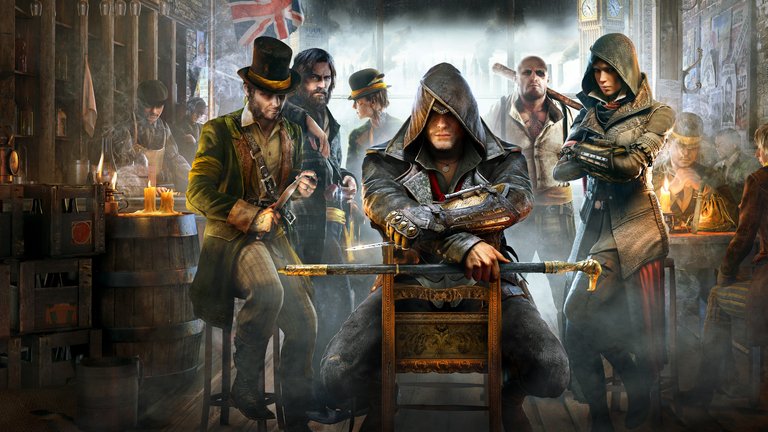 Image Source
Image Source
The year 2015 brought Assassin's Creed: Syndicate. The interest for the series was all but gone at this point. The formula was stale. The tone of this game also didn't help after the bleakness of Unity. This was te first mainline game made by Ubisoft Quebec, a studio which outputs good games, but not great stories, usually. Syndcate took place in Victorian London and was a simplification of Unity, in both gameplay and graphics, the later being an attempt to make it run better than its predecessor. There were a few additions though like a contextual cover system as opposed to the dedicated one in Unity, a combat system which was very shallow by itself, but added depth through speed, putting the accent on fast reactions and combos and a toned back parkour system not letting you hurl yourself off rooftops, but adding a grappling hook to grant you more mobility. Story-wise, the game can be summed up like this: twins Jacob and Evie Frye take over the city of London, the most dangerous Templar stronghold, to gain bragging rights for it. The main DLC, Jack the Ripper, fares better. It follows an older Evie trying to stop Jack, a deranged individual who twisted the creed of the assassins into the creed of terror, creating an extremist splinter of the order. This is actually a really interesting premise and I am a bit sad we didn't get a full game to explore something like this. This game marks the end of the era of classic Assassin's Creed, and now we are entering the RPG era. The corpse festers.
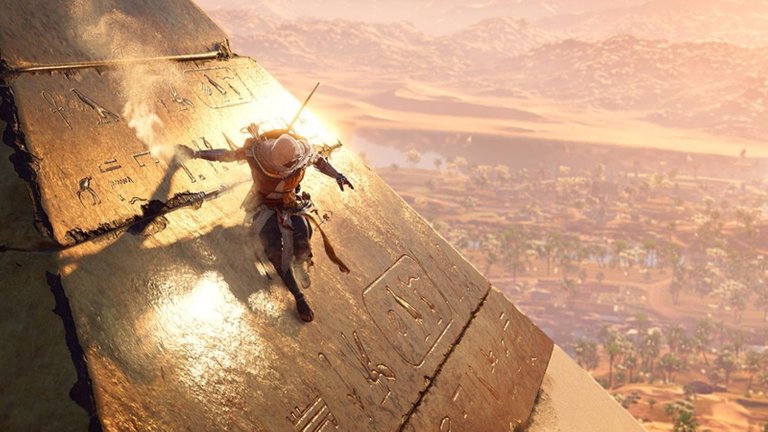 Image Source
Image Source
The series went on the backburner for a year to reinvent itself and, boy, did it do it. In 2017 we got Assassin's Creed: Origins, the first RPG in the series, heavily inspired by The Witcher 3. One of the 3 pillars crumbled: social stealth. The combat was revamped again with a stats and equipment based system, which felt pretty fresh and we also got one big thing to compensate for the loss: exploration. An Assassin's Creed game is only as good as the place and time it is set in and Egypt during the time on Cleopatra is just perfect. It also helps that the story is great this time too, featuring Bayek's journey from grieving father to co-founder of the Hidden Ones, the precursor of the Assassin Order. Modern day was also promising, you take the role of Layla Hassan, a rogue ex-employee of Abstergo who is actually hunted by them and is investigating Bayek's memories. In the end she is contacted and recruited by the Assassins. The game also got 2 DLCs, The Hidden Ones and The Curse of Pharaohs, the first one acting as an epilogue for the story of the main game and the second one being a mythological romp through several versions of Egyptian afterlife. Although a mythology focus does not really fit, Origins earned it by holding back on it until the last second, instead of leaning hard into it the entirety of the game. The corpse gets embalmed.
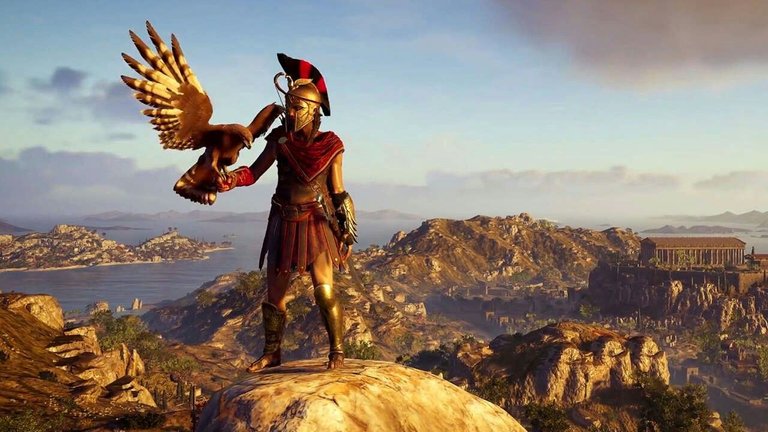 Image Source
Image Source
While Origins managed to magically work, we are reaching Odyssey, a game which really doesn't want to be an Assassin's Creed game. It takes place before Origins and you play as a misthios (aka mercenary) during the Peloponesian War in Ancient Greece. This one leans heavily into mythology and explaining the First Civilisation, retroactively named Isu at some point, and less into history. The modern day is also kinda messy, Layla actually meeting the main character of the game, either Alexios or Kassandra (the latter being the canon one) who hands them the Trident of Eden which makes the user immortal and also corrupts them. Gameplay-wise, it is kinda similar to Origins, but it is heavily geared more towards combat, stealth acting more like a combat starter, since you can't stealth kill most enemies. More specifically only the basic enemies can be reliably stealth assassinated, the others suffering only critial damage from your attempt. The combat itself is great, even though it leans heavily into magical attacks, being geared towards being aggressive, breaking shields, combining abilities and being pretty deep and enjoyable, even if it doesn't fit the game the title is suggesting. Suffice to say, this would have fared a lot better if it spun off into its own IP, which kinda led to Immortals: Fenyx Rising. The game had an interesting DLC, Legacy of the First Blade, which was very assassin flavored, as we got to work with Darius, one of the legendary old time assassins mentioned in the first few games. Your character would have a child with Darius's son/daughter (depending if you played as Kassandra or Alexios) and you would be hunted by the Order of Ancients, the same order from Assassin's Creed Origins, and you would also find out more info about their founding and founder. The next DLC, Fate of Atlantis, would lean hard into explaining the Isu, having you run through simulations of the Underworld and Atlantis itself, and, I have to be honest, they were really interesting, even though they ruined the mystery of the First Civilisation, cultivated through the series.
 Image Source
Image Source
And now, we finally reach Valhalla. I have to make a confession about this one: I abandoned it and went back to finish Liberation and Syndicate which I had previously abandoned. The game was great in the beginning, the gameplay was fun, but everything is based around repeating stuff, somehow coming full circle to the first game, but without the flair. At this point, this isn't even an Assassin's Creed game, but a viking adventure game wearing the flayed skin peeled from the corpse of the series. Social stealth is back, but in name only, as it only presumes putting a hood on your head and interacting with already established bleding spots, whch is also pointless because normal stealth is faster, when it works, and combat is even faster and too easy. The modern day is kind of a retread of III's, trying to stop a cataclysmic event which could wipe out humanity. It also has an obsession with mythology, 2 whole story arcs revolving around Odin and his exploits through the realms. The first few story arcs feel fine, but then you notice they follow the same formua: go to region, talk to person you want to rule the region, do conquest tasks, kill or depose the current leader, instate your guy, profit. The latest game/standalone DLC/Shadow of Mordor without nemesis system thing, Dawn of Ragnarok swings fully into Norse mythology, havingt you fight as Odin through frost and flame giants to rescue Baldr.
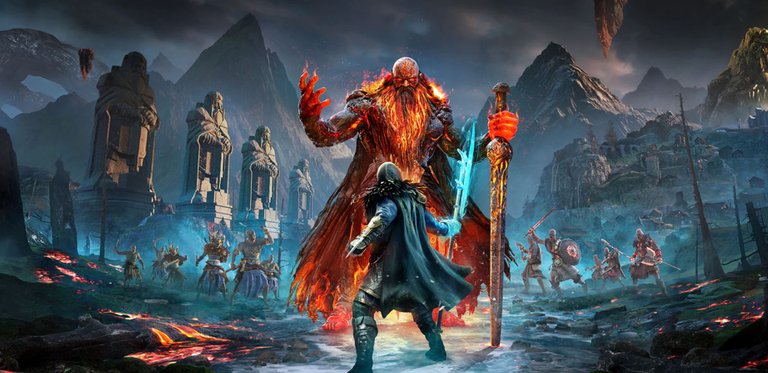 Image Source
Image Source
As you can see, the series had a slow descent, partly due to it getting more stale as a concept as time moved on, but mostly because it went off the rails from its representation of believeable hstorical fiction and respecting the core pillars whcih stood at the inception of the series: social stealth, combat and navigation. In the end, what rose from a series based in Persian mythology, fell from grace due to it relying on mythology to try and keep a desecrated corpse alive. I have very conflicting feelings about this series, as I have big emotional attachment to it, having grown with its releases, waiting for next year's continuation of the story, at least 2009-2012, but now it feels like meeting an old friend I haven't talked to in a while and having no common ground anymore.
Archdruid Discord: https://discord.gg/cw3z74sGamingHD Discord: https://discord.gg/CZSXJwy
~~~ embed:1541021936247083009 twitter metadata:dmxhZGFsZXhhbnx8aHR0cHM6Ly90d2l0dGVyLmNvbS92bGFkYWxleGFuL3N0YXR1cy8xNTQxMDIxOTM2MjQ3MDgzMDA5fA== ~~~
The rewards earned on this comment will go directly to the people sharing the post on Twitter as long as they are registered with @poshtoken. Sign up at https://hiveposh.com.
Have to agree with pretty much everything. As a big fan of Assassins Creed myself, I enjoyed (and still enjoy replaying ever so often) the original storyline thoroughly. As well as Black Flag and the stories of Connor Kenway.
But I agree with you. The captivating story, the neverending "cat and mouse" game between the Assassins and the Templar Order portrayed in the first few games is nonexistent in the latter ones. Especially in the last three games which I decided on not playing altogether. (Origins, Odyssey, Valhalla) since I do also think they're basically Witcher 3 with Assassins Creed name stamped on top. Does not have the feeling, the vibe and the stealthy aspect of the other ones.
Unity, could be awesome. Could be much, much better. (SPOILER the sudden time jump to for example, WW2 was amazing and is definitely a missed opportunity IMO. SPOILER)
To add on top of what you said about Unity, both it and Rogue bring great new angles to the story, Rogue with all that defecting to the Templars and Unity having Arno be raised by the Templar Grand Master, but intentionally not being indoctrinated by him, and also his really one sided love for Elise.
At least Unity got some story redemption with Dead Kings, watching Arno get back his will to fight after wallowing as a vagabond after the main game was pretty poignant.
Es una gran franquicia que decayó al querer exprimirlo comercialmente, recuerdo amar el assassin creed brother hood. Por ahora jugué solo los primeros tres pero deseo quedarme con esos buenos recuerdos y no con el gusto amargo de próximas entregas.
I do not speak Spanish, so bear with me here. To be honest, most of the games are still very enjoyable, but you have to have the right mindset to play them. Most of them left me with good memories, but if you go into them expecting the mood of the games up till III, you will get whiplash and will be disappointed. Even Valhalla has its redeeming factors, setting a pretty authentic feeling viking loop of looting and fighting, problem being it relies on it too much.
This Was Such A Brilliant Review! The Series Was Pretty Amazing But Origins, Odyssey & Valhalla Didn't Have That Same Feel For Me.
In my opinion Origins still holds some of the feeling even though it heavily deviates from the original design of the series. It's the only one of the RPG saga I actually enjoyed and Bayek's role as a Medjay really flows well into forming the creed. Thing is, the games that came after took the wrong lessons from it, which is really a shame.